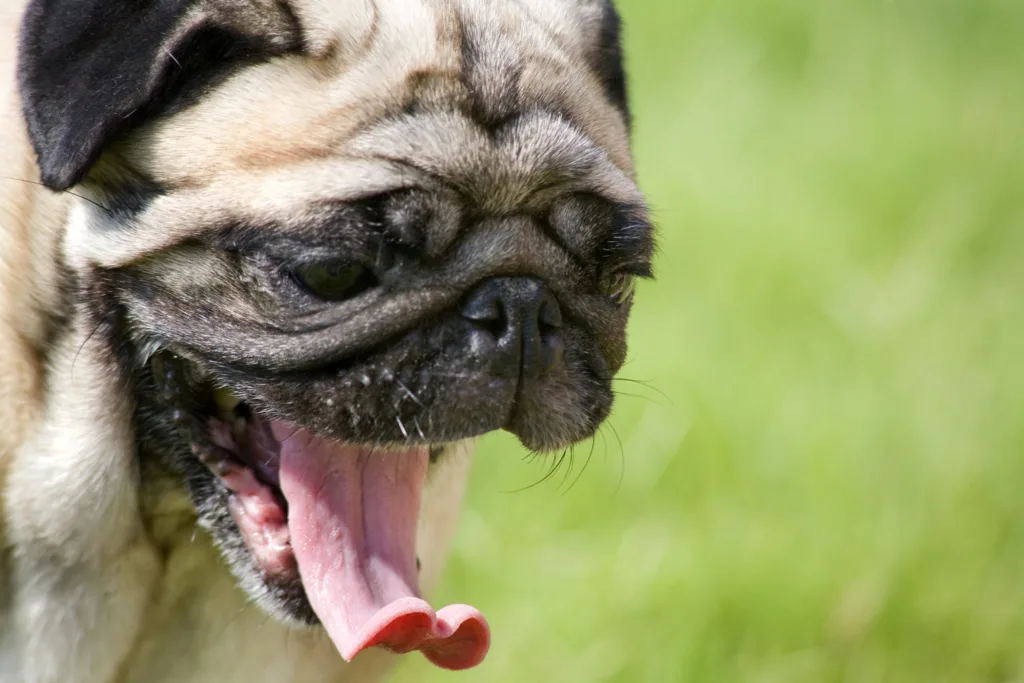Dog keeps sneezing: Dogs sneeze just like humans. Your dog may not sneeze or appear like your own but they both provide the same function – to clear the nasal passages.
When dirt, dust, or household aerosols enter your dog’s nose, they can cause sneezing.
What should you do if you notice that your dog is sneezing more than usual? To answer that question, the common causes of dog sneezing, how to help your dog, and sneezing can be a sign of something more serious.
5 Strong possible reasons Why Your Dog Keeps Sneezing
There are many different causes of dog sneezing, most of which are easy to spot. But if your pet starts to sneeze frequently, that means there is still a lot to explore.
Also Read: Can Dog Eat Black Pepper? Is Black Pepper Healthy?
1. Foreign Bodies
As a dog owner, it is important to monitor any changes in your pet’s behavior or any signs that something is wrong. As always, consult your veterinarian if you feel something has gone wrong. Here are some common causes of sneezing and the steps you can take to resolve the condition.

If there is anything that is good for dogs, it is getting into some dangerous situations. Whether it’s dirt, grass, trash, sand, or digging around the house, tiny particles and other foreign bodies (debris, toy parts, bugs, etc.) can get into your pet’s nasal passages.
Sneezing is an excellent way to expel these foreign objects, and it usually does the trick. However, if the sneezing persists and your puppy is sniffing at their nose, it may be a sign that the irritant is still there.
What to do about it: Even if you can’t remove a dog’s natural nose, you can do it without digging them or getting into troubled areas. If you can instantly see what is in your dog’s nose, you can remove it with tweezers. If you do not see anything and your dog does not stop pawning the area, schedule a vet visit to properly examine the nasal cavity.
2. Seasonal or environmental allergies
Like humans, some dogs have allergies and sneezing is a common symptom. Some foods such as beef, chicken, and dairy may be allergens, but a recent report on pet health found that environmental allergens are more likely to be the culprit.
Although these irritants fluctuate depending on the area and the weather, there are many in your home – dust (and dust mites), pollen, dandruff, mold, clothes, medications, and cleaning solutions. If your dog has a runny nose, watery eyes, and sneezing, it may be a sign of a seasonal allergy.
What to do about it: Consider including an allergy supplement in your dog’s diet. PetHonesty’s AllergySupport Chews Supports your pet’s immune system and provides relief from environmental, skin, food, and seasonal allergies. You can also talk to a veterinarian to find out what type of allergy test is right for your dog.
3. Playing in a Muddy Area
This may sound silly to humans, but “sneezing” is a real thing for dogs. If you ever see the excitement your puppy is playing with, chances are you see your dog “sneezing”.
No need to worry about snoring-like behavior — this is your dog’s way of communicating with other dogs. Some experts also point out that when dogs play and become slightly rambunctious, it can increase the amount of dust, dirt, pollen, or other irritants that can cause a dog to sneeze.
What to do about it: Have fun! Sneezing is completely normal and is a good sign that your dog is happy. There are great pleasures such as your pet living their best life and participating in a little fun sneezing.
4. Airway obstruction
brachycephalic breeds such as French and English Bulldogs, Pugs, Boxers, Pekingese, Lhasa Apsos, and Boston Terriers will have this kind of sneezing more commonly.
Because of their small heads and compressed nasal passages, these dogs often have difficulty sneezing, breathing, snoring, snoring and breathing, exercising, and tolerating heat.
What to do about it: See your vet to properly diagnose your dog and to determine the best course of action for surgery or surgery.
Be sure to manage your dog’s weight so that obesity can exacerbate symptoms. Also, use a saddle that does not tug the fur area of your furry friend to reduce stress.
5. Nose worms
As the name implies, dog nasal worms are small parasites that live in the dog’s nasal passages and sinuses.
These bugs can be easily transmitted from one dog to another, causing chronic nasal itching, nasal discharge, sneezing, shaking of the head, nosebleeds, and reverse sneezing (more on this later). As with any nosebleed, always seek medical attention from a veterinarian.
What to do about it: The only way to verify that your dog has nasal worms is to have a veterinarian perform a CT scan, nasal endoscopy, or nasal flush.
Most rhinitis cases can be effectively treated with antiparasitic medications prescribed by a doctor.
The Canine Reverse Sneeze
When dogs sneeze, there is another item to include on your “must know” list — reverse sneezing. Dogs not only play sneeze, but they also have reverse sneezing.
Although it is not technically sneezing – this is called paroxysmal respiration – reverse sneezing occurs when dogs inhale air quickly through the nose rather than pushing it out of the nose.
The result is a loud snoring noise that you may think the dog is choking or having an asthma attack.
Reverse sneezing is common in small dogs and brachycephalic breeds. The sound moves, but there is no need to worry about it and it ends in a few minutes.
What to do about it: Give a massage your dog’s neck for a soothing effect. Some experts suggest a smooth blow on your dog’s face to trigger the swallow reflex and reset normal breathing.
If your dog seems to have persistent episodes of reverse sneezing, a vet visit can help identify and treat any underlying problems.
My dog keeps sneezing and has a runny nose
Sneezing is a normal part of life for humans and dogs. This is a natural way to get rid of unnecessary irritation and keep our noses clean.
Although there are many common causes of sneezing in dogs – from allergies to infections and even playtime – very often, sneezing is not a cause for concern and so is the running nose.
However, knowing the causes, symptoms, and treatments for dog sneezing can help you learn more about your dog’s specific needs and eventually become a better pet parent.

